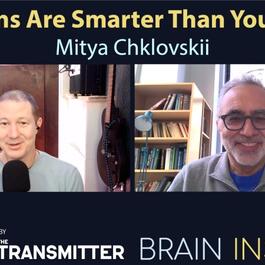
BI 205 Dmitri Chklovskii: Neurons Are Smarter Than You Think
Support the show to get full episodes, full archive, and join the Discord community. The Transmitter is an online publication that aims to deliver useful information, insights and tools to build bridges across neuroscience and advance research. Visit thetransmitter.org to explore the latest neuroscience news and perspectives, written by journalists and scientists. Read more about our partnership. Sign up for the “Brain Inspired” email alerts to be notified every time a new “Brain Inspired” episode is released: To explore more neuroscience news and perspectives, visit thetransmitter.org. Since the 1940s and 50s, back at the origins of what we now think of as artificial intelligence, there have been lots of ways of conceiving what it is that brains do, or what the function of the brain is. One of those conceptions, going to back to cybernetics, is that the brain is a controller that operates under the principles of feedback control. This view has been carried down in various forms to us in present day. Also since that same time period, when McCulloch and Pitts suggested that single neurons are logical devices, there have been lots of ways of conceiving what it is that single neurons do. Are they logical operators, do they each represent something special, are they trying to maximize efficiency, for example? Dmitri Chklovskii, who goes by Mitya, runs the Neural Circuits and Algorithms lab at the Flatiron Institute. Mitya believes that single neurons themselves are each individual controllers. They're smart agents, each trying to predict their inputs, like in predictive processing, but also functioning as an optimal feedback controller. We talk about historical conceptions of the function of single neurons and how this differs, we talk about how to think of single neurons versus populations of neurons, some of the neuroscience findings that seem to support Mitya's account, the control algorithm that simplifies the neuron's otherwise impossible control task, and other various topics. We also discuss Mitya's early interests, coming from a physics and engineering background, in how to wire up our brains efficiently, given the limited amount of space in our craniums. Obviously evolution produced its own solutions for this problem. This pursuit led Mitya to study the C. elegans worm, because its connectome was nearly complete- actually, Mitya and his team helped complete the connectome so he'd have the whole wiring diagram to study it. So we talk about that work, and what knowing the whole connectome of C. elegans has and has not taught us about how brains work. Chklovskii Lab. Twitter: @chklovskii. Related papers The Neuron as a Direct Data-Driven Controller. Normative and mechanistic model of an adaptive circuit for efficient encoding and feature extraction. Related episodes BI 143 Rodolphe Sepulchre: Mixed Feedback Control BI 119 Henry Yin: The Crisis in Neuroscience Read the transcript. 0:00 - Intro 7:34 - Physicists approach for neuroscience 12:39 - What's missing in AI and neuroscience? 16:36 - Connectomes 31:51 - Understanding complex systems 33:17 - Earliest models of neurons 39:08 - Smart neurons 42:56 - Neuron theories that influenced Mitya 46:50 - Neuron as a controller 55:03 - How to test the neuron as controller hypothesis 1:00:29 - Direct data-driven control 1:11:09 - Experimental evidence 1:22:25 - Single neuron doctrine and population doctrine 1:25:30 - Neurons as agents 1:28:52 - Implications for AI 1:30:02 - Limits to control perspectiveSupport the show to get full episodes, full archive, and join the Discord community. The Transmitter is an online publication that aims to deliver useful information, insights and tools to build bridges across neuroscience and advance research. Visit thetransmitter.org to explore the latest neuroscience news and perspectives, written by journalists and scientists. Read more about our partnership. Sign up for the “Brain Inspired” email alerts to be notified every time a new “Brain Inspired” episode is released: To explore more neuroscience news and perspectives, visit thetransmitter.org. Since the 1940s and 50s, back at the origins of what we now think of as artificial intelligence, there have been lots of ways of conceiving what it is that brains do, or what the function of the brain is. One of those conceptions, going to back to cybernetics, is that the brain is a controller that operates under the principles of feedback control. This view has been carried down
From "Brain Inspired"


Comments
Add comment Feedback